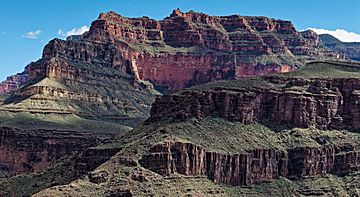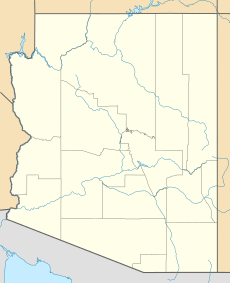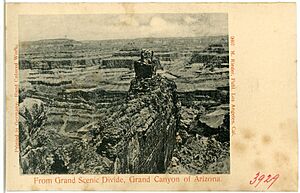Grand Scenic Divide facts for kids
Quick facts for kids Grand Scenic Divide |
|
|---|---|

North aspect
|
|
| Highest point | |
| Elevation | 5,667 ft (1,727 m) |
| Prominence | 87 ft (27 m) |
| Isolation | 1.04 mi (1.67 km) |
| Parent peak | Fossil Mountain (6,729 ft) |
| Geography | |
| Location | Grand Canyon National Park Coconino County, Arizona, US |
| Parent range | Coconino Plateau Colorado Plateau |
| Topo map | USGS Havasupai Point |
| Type of rock | sandstone, limestone, shale |
| Climbing | |
| Easiest route | class 2 hiking |
Grand Scenic Divide is a 5,667-foot-tall (about 1,727-meter) ridge. It is located in the amazing Grand Canyon in northern Arizona, USA. This ridge sits right north of Fossil Mountain. It is also about 1.5 miles east of Mount Huethawali.
The Grand Scenic Divide is surrounded by Bass and Serpentine Canyons. It rises more than 3,400 feet (1,036 meters) above the nearby Colorado River in just 1.5 miles. This means it's very tall compared to the river! The ridge is made of different rock layers. These include sandstone, limestone, and shale. The area has a cold semi-arid climate. This means it is usually dry and cool.
You can reach the ridge by hiking the South Bass Trail. From the top, you can see many cool places. These include Masonic Temple, Holy Grail Temple, and Dox Castle. You can also spot King Arthur Castle, Evans Butte, Sagittarius Ridge, and Scorpion Ridge.
Why Is It Called Grand Scenic Divide?
The Grand Scenic Divide got its name because it's a special place. It's where the Grand Canyon really changes how it looks. To the east, you see many separate towers, flat-topped hills called buttes, and temples. These are what make the Grand Canyon so beautiful. But to the west, the scenery is not as striking.
This natural dividing line is also where the hard granite rock of the inner canyon disappears. This means that the cool buttes could not form further west. The name for this amazing place was first used by William Wallace Bass. It was officially accepted in 1932 by the United States Board on Geographic Names.
Meet Dick Pillar
Dick Pillar is a red sandstone peak. It is found at the northeast end of the Grand Scenic Divide. This peak is unofficially named after Robert Dick. He was a Scottish geologist. His work helped us understand the rocks of the Grand Canyon much better.
 | Delilah Pierce |
 | Gordon Parks |
 | Augusta Savage |
 | Charles Ethan Porter |




